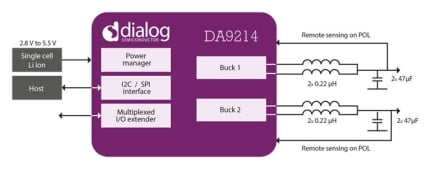Overview
Description
The DA9214 is a synchronous dual step-down converter supplying the processor core and GPU rail in smartphones, tablets, Ultrabooks™, and other handheld applications requiring high currents. DA9214 is also suitable for powering FPGAs.
The input voltage range of 2.8V to 5.5V makes it suitable for the use of single-cell Lithium-ion battery applications as well as standard 5V supply or USB power supplies. DA9214 delivers 2x 10A output current, suitable for the highest-performing application processors such as the multi-core arrangements of the Arm® Cortex®-A15/A57 family. Due to the multiphase topology, DA9214 provides outstanding load transient response and component sizes below 1mm height.
Features
- 2.8V to 5.5V input voltage
- 0.3V to 1.57V output voltage
- 2x 10A output current
- Dynamic Voltage Control (DVC)
- 3MHz nominal switching frequency
- Load transient response ±3.5%
- Adjustable soft start
- -40 ℃ to +85 ℃ temperature range
- Interface I²C and SPI
- Integrated power switches
- Remote sensing at point-of-load
- High efficiency over a wide output range
- Low output ripple
- Small <1mm height components
Comparison
Applications
- Smartphones
- Cordless phones
- Ultrabooks™
- Tablet PCs
- eReaders
- Infotainment
- Portable navigation devices
- TVs
- Portable media players
Documentation
|
|
|
|
|---|---|---|
| Type | Title | Date |
| Datasheet | PDF 1.32 MB | |
| Product Brief | PDF 857 KB | |
| Application Note | PDF 1.12 MB | |
| Manual - Development Tools | PDF 1.70 MB | |
4 items
|
||
Design & Development
Software & Tools
Models
ECAD Models
Schematic symbols, PCB footprints, and 3D CAD models from SamacSys can be found by clicking on products in the Product Options table. If a symbol or model isn't available, it can be requested directly from the website.

Product Options
Applied Filters:
